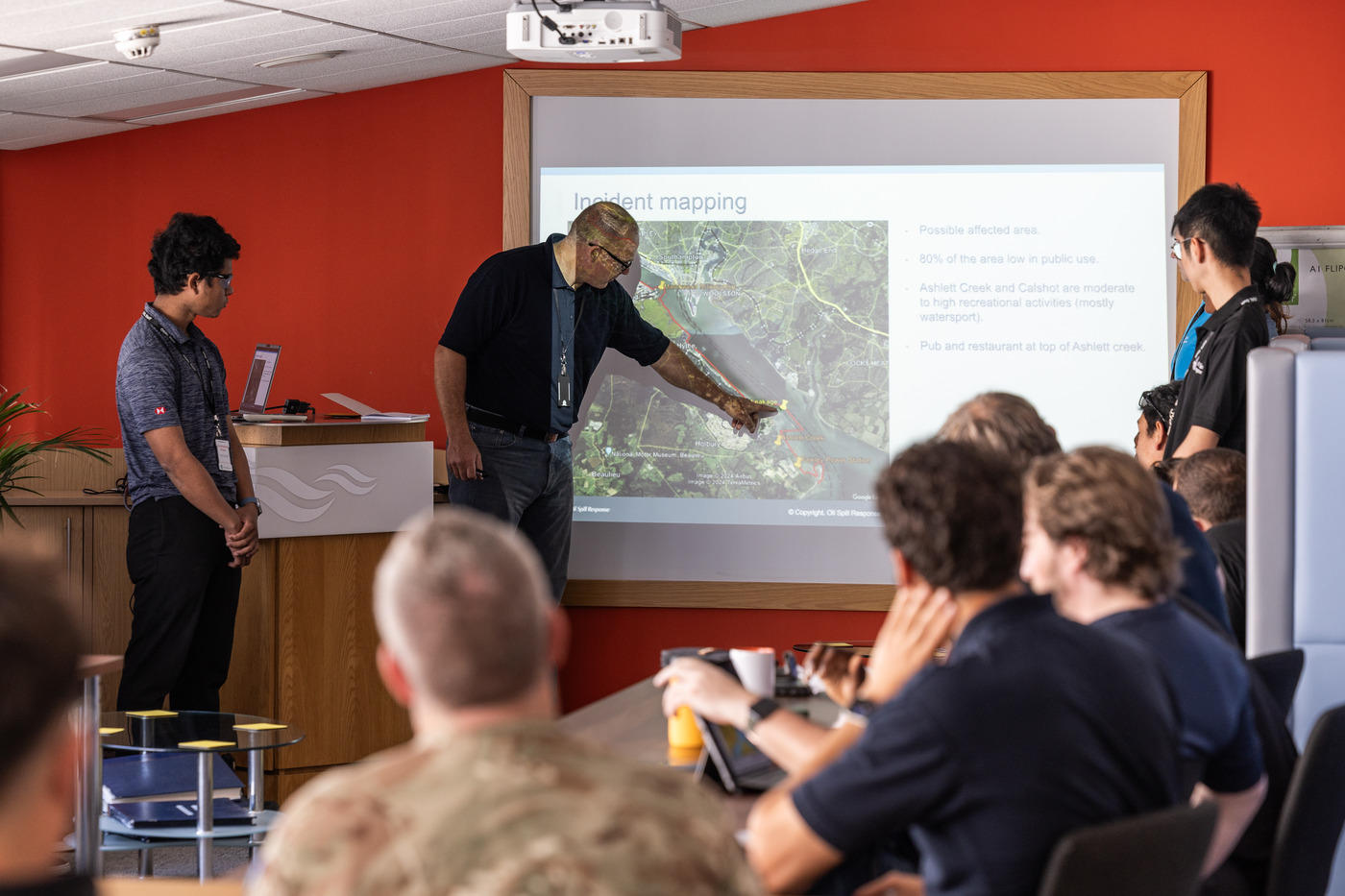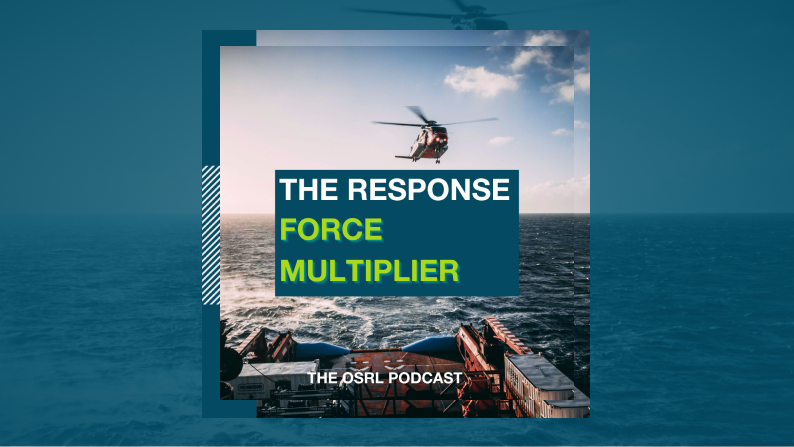Developing Leaders for a Crisis – Ego is the Enemy
In April 2010, when an explosion on the Deepwater Horizon platform triggered the world's largest accidental oil spill, all eyes turned to the Gulf of Mexico and the unfolding tragedy. In his quickly appointed role as National Incident Commander (NIC), United States Coast Guard Admiral Thad Allen was faced with an extraordinary task: deliver the US Government's response to this unprecedented and developing crisis.
With tens of thousands of people involved in the response efforts, Allen was placed into a chaotic and complex situation. He spearheaded countless teams, third-party organisations, and thousands of volunteers – all working to minimise the spill's social, economic, and environmental impact.
Simultaneously, Allen also had to:
- liaise with various corporate interests
- manage an array of intergovernmental and interagency relationships
- provide public updates on the response's activities and results
Allen was no stranger to crisis management. He was involved in the US Government's response to Hurricane Katrina and the 9/11 terrorist attacks. However, it was clear that this crisis would be different in size and impact.
The spill had the potential to devastate people's livelihoods across the Gulf and significantly impact the local marine ecosystem. It also threatened to destroy global entities and damage a host of senior public officials, including then US President Barak Obama.
Under incredible pressure to deliver results, Allen would later comment on the challenge he faced in fostering a "unity of effort" amongst the relevant parties involved.
Context Matters
Every day, most of us find ourselves in situations ranging from simple, certain, stable, and clear to volatile, uncertain, complex, and ambiguous. The more adept leaders amongst us succeed because they can shift gears appropriately, absorb the increasing complexity, and convey a clear and straightforward plan.

The first challenge that most crisis leaders face is recognising the complexity of the situation they find themselves in. For this, we find that the Cynefin Framework, a Sense Making model developed by Dave Snowdon is beneficial.
| Complex: A scenario that is only retrospectively coherent; cause and effect is not predictable | Complicated: A scenario that is potentially knowable; cause and effect is opaque, and experts are required to understand |
| Chaotic: An incoherent scenario; no link between cause and effect, requires stability | Simple: A scenario where an established relationship between cause and effect exists, and the situation is perceivable, predictable and repeatable |
A crisis is interesting as it is often multifaceted, requiring leaders and Crisis Management Teams to operate across all four domains simultaneously:
- To navigate the 'Complex' and manage polarities
- To engage experts to solve the 'Complicated'
- To stabilise the 'Chaotic'
- To bring best practice to the 'Simple'
Whilst all these activities are often essential if a crisis is to be averted, the focus of this article is on the complex domain and how we can best equip leaders to deal with complexity in a crisis.
The Development Gap
Without deliberate development, most leaders lack the required competencies to perform well in the complex domain. This is because most leaders make sense of the world in a way that is directly at odds with what is required in the complex domain.
Most conventional leadership development programmes fall short of developing the sense-making systems that leaders require in the VUCA world. This is because many leadership development programmes don't challenge leaders to fundamentally examine the belief systems that form the basis for their leadership behaviours. The very same behaviours are tested to their limits when operating in the complex domain.
In our experience, three components enable leaders to perform well in a crisis (all domains):
- Structure – policies, processes, operating procedures, decision-making tools
- Skillset – the technical understanding and behavioural requirements of a role, whether knowledge-based or skills-based
- Mindset – the temperament and awareness of self, recognising that our beliefs and attitudes determine the way we make sense of our world and that we may not be aware of some or all of these beliefs and attitudes, and the way they shape our actions and behaviours
Yet most corporate leadership development programmes seem to focus almost exclusively on skill development, whilst most crisis management training seems to focus on structure.
Although skill development is fundamental to leader development, we see this approach as flawed. It fails to encourage the individual leader to look deeper and examine the beliefs, which form the foundation of their behaviours, actions and decisions.
These beliefs and attitudes have a much more significant effect on behaviours, mainly when individuals are under pressure and are more likely to resort to habitual patterns of behaviour – behaviours that come naturally, whether they are 100% effective or not.
"In Over Our Heads"
To equip leaders to perform at their best in the complex domain of a crisis, we must first create the conditions for them to hone their skills outside of a crisis. For this, we draw heavily on the work of Robert Kegan, the Harvard psychologist.
Kegan contends that as we all move through life, we are transitioning between defined stages of development. These stages reflect our shifting perceptions of the world, and our understanding of our position within it – our 'identity' or 'ego'.
He states that development begins with the ‘Impulsive’ mind of early childhood, transitioning through the ‘Imperial’ mind of adolescence (when we focus on our own agenda) to the ‘Socialised’ mind of adulthood (where we develop empathy and are concerned with the ideas and societal beliefs of the people and systems around us).
Kegan and his fellow researchers have concluded that most functioning adults make it to the Socialised stage of development by the time they reach their late teens or early twenties and spend the rest of their lives in that mindset.
The socialised mind gives us everything we need to function as an effective member of society; however, it is insufficient for the challenge of leading in the complex domain of a crisis. For this, we need to transition to the fourth stage as a minimum.
Keegan calls the fourth stage the Self-Authoring mind, as it defines the stage where our self-worth is no longer intrinsically linked to other's views, or at least to the same degree.
It is the stage where we can create our own narrative within the confines of social norms and the point where we understand that we are independent of the expectations of our environment. At this stage, leaders can handle the complexity of thought and action that a crisis demands.
The fifth and final stage, according to Kegan, is the Self-Transforming mind. Here, we reach a state where we can inhabit multiple perspectives simultaneously and where we accept that our identity is continuously evolving – informed by the entirety of our experiences and the opinions of those around us, but not dependent upon them.
Interestingly, unlike the first three stages of development, both the Self-Authoring and Self-Transforming stages must be actively learnt – they don't happen automatically. As a result, it is predicted that only 30% of the general population will ever transition to the fourth stage in their development, and only five per cent will reach the fifth stage.
Consequently, many leaders still lack a genuinely independent sense of self and continue to seek the approval of others in terms of what they think, believe and feel. This seeking approval becomes an issue for those responsible for complex situations if they are firmly rooted in socialised beliefs and internal assumptions.
For leaders to thrive during even the most complex emergency responses, we must help facilitate the shift in perspective and understanding necessary to occupy the Self-Authoring and Self-Transforming stages of development. When a leader transitions into these stages, they can more reliably access the leadership competencies that will serve them well in a crisis.
"The Hero's Journey"
The shift from the Socialised to the Self-Authoring form of mind requires deep contemplation and reflection over many months, if not years. This process is often referred to as ‘the Hero's Journey' because it requires us to examine and potentially dismantle some of our beliefs and internal assumptions.
This process takes immense courage and is probably why so few adults reach the Self-Authoring stage of development. Finding space for deep contemplation is perhaps more challenging now given the pace of life, hence why companies must put programmes in place to enable such contemplation and reflection. In our experience, structured group work and individual performance coaching are the most effective methods for enabling leaders to achieve this.
The Leadership Circle Profile - a Universal Model of Leadership
We use The Leadership Circle Profile (LCP) to augment this performance coaching conversation, which incorporates many different leadership and psychological theories.
It is most commonly deployed as a 360-degree profiling tool and assesses how those around them are experiencing a leader. The LCP is interesting because it shines a light on some of the beliefs and internal assumptions guiding a leader's behaviour.
It is important to note that the LCP is not a crisis leadership instrument – it is a 'business as usual' instrument. However, if leaders are to excel in a crisis, they must first hone the necessary beliefs and behaviours outside of a crisis when the pressure is typically less acute.
Visually, the LCP divides into quadrants, with 'creative competencies' occupying the top half of the circle and 'reactive tendencies' occupying the lower half of the circle. 'Relationship' orientated behaviours occupy the left side, and 'task' orientated behaviours occupy the right side.
The Creative competencies measure key behaviours and internal assumptions that lead to high fulfilment, high achievement leadership. When leaders are 'creative', they are experienced by those around them as open and curious, empathic and present, authentic and purposeful. A 'growth' mindset prevails.
The reactive tendencies reflect inner beliefs that limit effectiveness, authentic expression, and empowering leadership. When leaders are 'reactive', they are experienced by those around them as closed and defensive, perhaps distant and insincere. A 'fixed' mindset prevails.
Reactive tendencies are to be expected because they are the product of a socialised form of mind. However, studies have shown that leaders who routinely demonstrate creative competencies are consistently viewed as more effective by those around them when compared to leaders that display reactive tendencies.
What's more, the teams that they lead are more successful when judged by nearly every conventional measure. Whilst these studies have been conducted in a non-crisis setting, we think that the lessons are equally applicable to a crisis situation.

Broader Implications - addressing the performance gap
Humanity is grappling with the challenges of our time:
- the pandemic
- the climate crisis
- inequality
- extremism
- terrorism
- nationalism vs globalism
- ‘left’ vs ‘right’
It is becoming increasingly clear that the Socialised mind is insufficient at enabling leaders to resolve these issues.
Operating with a Socialised mind, leaders cannot conceive – let alone implement – the kinds of solutions required. This mismatch between the demands of the situation and the individual's complexity of mind gives rise to a development gap (see graphic below). It is this gap that organisations need to target if leaders are to thrive in the complex domain.

In Conclusion
With a Socialised mind, the best a leader can do is try to simplify the context. We have seen this at work on the political stage in recent years with the spreading of ‘alternative facts’ and ‘fake news’, all an attempt to feed the leader’s ego and shape the narrative in the leader’s favour. More than ever, we need leaders who can thrive in complexity.
No organisation is immune to a crisis - are you ready?
Ensure you have an effective Crisis Management Team and functional crisis preparedness system in place with our Crisis Preparedness Services.







